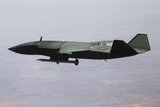Elbit to supply self-protection systems for Asia-Pacific helicopter fleets
Elbit's Mini-MUSIC weighs 19kg and can be installed in dual- or single-turret configuration on helicopters and turboprop transport aircraft. (Image: Elbit)
Elbit Systems has been awarded a contract valued around $200 million to supply electronic warfare and infrared technologies to protect military helicopter fleets for a customer in Asia-Pacific. The contract will be implemented over four years.
Elbit will supply self-protection suites comprised of the Passive Airborne Warning System (PAWS) and Mini-MUSIC direct IR countermeasures (DIRCM). These are designed to protect against shoulder-fired heat-seeking missiles and will be installed aboard attack and utility helicopters for the customer.
MUSIC-family DIRCM systems have been selected by numerous air arms worldwide, including the UAE and NATO for A330 MRTT tankers.
Related Equipment in Defence Insight
More from Air Warfare
-
![Singapore Airshow 2026: Rafael highlights tailored effector solutions for different operational needs]()
Singapore Airshow 2026: Rafael highlights tailored effector solutions for different operational needs
Shephard spoke with Rafael’s CEO about the company’s effector offerings as well as his perspective on one-way attack drones.
-
![Singapore Airshow 2026: CCA manufacturers eye growing opportunities in Asia-Pacific]()
Singapore Airshow 2026: CCA manufacturers eye growing opportunities in Asia-Pacific
Companies offering collaborative combat aircraft say there is a massive potential for countries adopting the capability in the Asia-Pacific region.
-
![Singapore Airshow 2026: Saab eyes “share” in future fighter market, targets 2027 CCA demo flight]()
Singapore Airshow 2026: Saab eyes “share” in future fighter market, targets 2027 CCA demo flight
The Swedish government is expected to make a decision on the next steps of the Future Fighter System Concept programme by 2030, with the current second phase focusing on technology knowledge expansion and demonstration flights.
-
![Singapore Airshow: Red Cat ramps up portfolio development amid “key” APAC opportunities]()
Singapore Airshow: Red Cat ramps up portfolio development amid “key” APAC opportunities
In the wake of its 1,842% year-on-year revenue increase in Q4 2025, Red Cat sees mass opportunities in the Asia-Pacific region as the company eyes an ongoing production increase and market growth.























